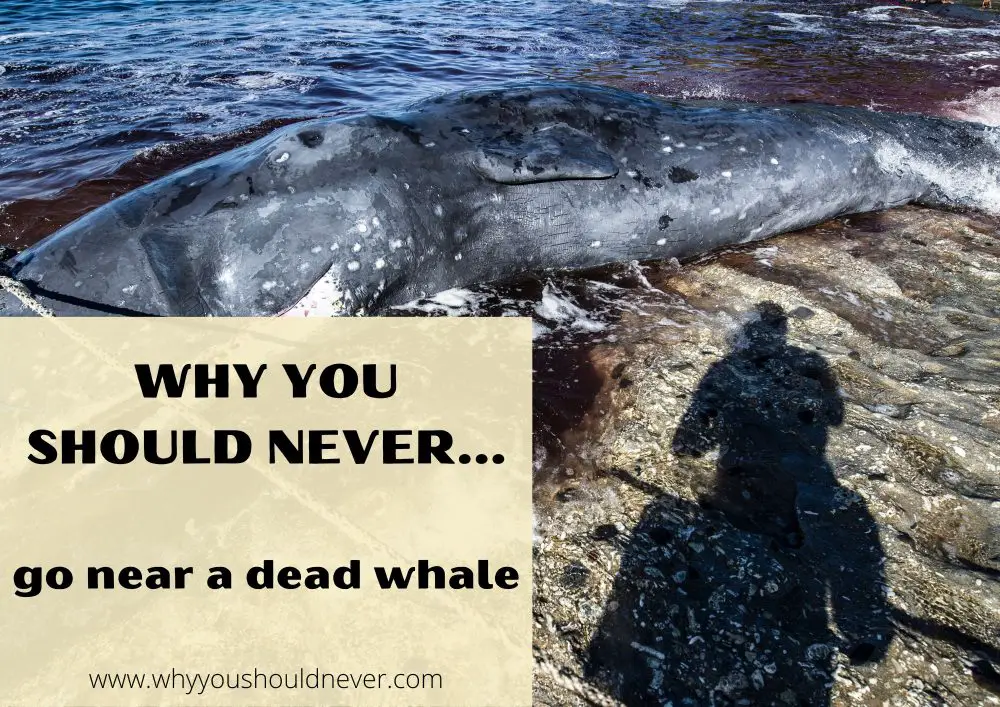![]()
Why You Should Never Go Near A Dead Whale
There are few things in the world more intriguing than a massive whale carcass washed up on the shore. The sight of a lifeless, rotting giant from the sea is enough to draw crowds from far and wide who come to witness and photograph this rare spectacle.
Yep, human beings are, quite frankly, lunatics! And we wouldn’t have it any other way.
But occasionally, this morbid curiosity can lead to some seriously dangerous situations. Going anywhere near a dead whale is not just foolish, but it can also be fatal. Wanna know why? Read on…
7 reasons why you shouldn’t go near a dead whale
1. They’re ticking time bombs
Whale carcasses have the potential to explode at any given moment, and this is no exaggeration! Gases build up inside the body as decomposition takes place, and when pressure becomes too much for their skin to handle – BOOM!
This can happen without warning, sending rotting blubber flying everywhere (including on you, if you’re too close). Exploding guts can seriously injure or maim anyone who happens to be too close.
2. The smell is atrocious
Whales are known for their pungent odor even when they’re still alive. So imagine the reek of a dead and rotting one! The stench can be overwhelming, nauseating, and cause you to gag or vomit uncontrollably.
3. They’re toxic
Whale carcasses carry a host of bacteria that are harmful to humans. A decomposing whale is filled with pathogens like E.coli and Salmonella, which can cause infections and get you really sick.
As the body breaks down, it also releases chemicals like ammonia and hydrogen sulfide gas, both of which are toxic in high concentrations. Touching or inhaling these substances can be extremely dangerous and even deadly.
4. There may be legal consequences
In many parts of the world, it’s actually illegal to approach or touch a dead whale. For example, in the United States, the Marine Mammal Protection Act prohibits interference with marine mammals – including whales – without a permit. Failing to follow these laws can result in hefty fines and potential jail time.
In Australia in 2010, two men were charged over allegedly removing the bones of a dead whale from the Mornington Peninsula beach.
5. They attract dangerous predators and other pests
Whale carcasses are like magnets for sharks, and not just any type of shark but great white and tiger sharks! These apex predators can smell blood from miles away, hence they come in droves to feast on the decomposing flesh. Depending on how close to the water you are, being near a dead whale puts you in danger of falling prey to hungry sharks.
It’s not just the sea-dwelling predators that pose a threat, either. Land animals like bears and wolves are also attracted to the smell of dead whales, especially in coastal regions where these animals reside.
Then there are the flies and scavenger birds who swarm the carcass and feed on its rotting flesh. You definitely don’t want to be anywhere near these pests, as they carry all sorts of diseases and infections that can make you sick.
6. The sight will make you sad and nauseous
Even if you’re not bothered by the smell or the potential danger, seeing a dead whale is still an unpleasant sight. These majestic creatures are intelligent and emotional beings, and witnessing their lifeless bodies washed up on shore can be both heartbreaking and nauseating.
7. It’s disrespectful to the whale
Lastly, approaching a dead whale could be seen as an insult to the animal itself. These creatures deserve our respect, even in death, and should be left alone to decompose in peace.
Furthermore, disturbing their bodies by poking or prodding them with sticks for “fun” is morally unacceptable.
Final thought
Oh, I know, the allure of seeing a huge creature like a whale up close is hard to resist, especially when it’s right there on the shore. I mean, how many chances do we get to see one of the largest mammals on earth up close and personal? Not many.
But let’s face it, going near a dead whale is simply not worth the risks. From being exposed to toxic chemicals and pathogens that can make us seriously ill, to attracting dangerous predators and pests, there are just so many good reasons why we shouldn’t get too close.
If your curiosity does happen to get the best of you, keep your distance and look from afar. This way, you’ll still be able to capture some amazing photos and memories while remaining safe.
